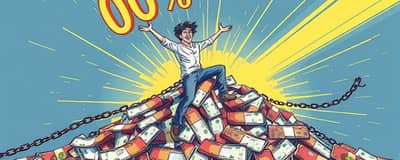Missing a credit card payment can feel like a small slip in a hectic day, but the ripple effects can last for years. Understanding the consequences and knowing how to take swift action can turn a momentary lapse into an opportunity for financial growth.
Defining a Late Payment
When your credit card bill isn’t paid by the due date, even if you pay some of the balance, it’s considered a late payment on record. The minimum payment is the threshold—anything less still counts as late. This simple fact sets off a chain of events that can affect fees, interest, and your credit history.
Immediate Consequences
As soon as your payment is past due, most issuers apply a late fee. Thanks to the Consumer Financial Protection Bureau’s regulation, this fee is now capped at an $8 maximum per occurrence as of May 2024, down from previous averages near $32.
At the same time, your unpaid balance continues to accrue interest—and that interest compounds daily, increasing your overall debt. You may also receive automated notices, emails, or calls reminding you of the overdue amount.
- Late Fee Charged Immediately: Up to $8 under the CFPB cap.
- Interest Continues to Compound: Higher total balance over time.
- Notifications and Restrictions: Account access may be temporarily limited.
Escalating Timeline and Credit Impact
Late payments grow more serious over time. The key milestones to watch are 30, 60, and 180 days past due. Each stage brings new penalties, from reporting to credit bureaus to potential charge-offs.
Once your issuer reports a missed payment after 30 days, it can stay on your credit report for up to seven years. Since payment history comprises 35% of your FICO score, a single reported miss can cost you 60 to 100 points depending on your profile.
Legal and Regulatory Safeguards
The U.S. government has put measures in place to protect consumers from excessive penalties. The Credit Card Accountability Responsibility and Disclosure (CARD) Act of 2009 requires that fees must reflect the issuer’s actual costs. More recently, the CFPB capped late fees at $8 to curb the billions collected annually.
- CARD Act of 2009: Fee caps tied to issuer costs and inflation.
- CFPB’s 2024 Fee Cap: Standardized maximum of $8 per late payment.
Long-Term Financial Harm
If you let a late payment slide into a charge-off at 180 days, the issuer writes the debt off as a loss, but you still owe the balance. This results in a derogatory mark on your credit report and often transfers the debt to collection agencies, who may pursue legal action.
Meanwhile, unpaid interest and any remaining fees continue to accumulate, making it harder to escape the debt spiral. Your ability to secure future loans or credit cards at competitive rates also diminishes, locking you into higher borrowing costs.
Steps to Mitigate Damage
Acting swiftly can dramatically reduce the harm of a missed payment. The closer you are to the due date, the less impact on your credit and wallet.
- Pay at Least the Minimum: Even one day past due may incur a fee, but paying within 30 days avoids credit bureau reporting.
- Contact Your Issuer Immediately: Explain your situation—many will waive the fee for first-time offenders.
- Explore Hardship Programs: Ask about reduced payments or payment plans if you face financial strain.
- Monitor Your Credit Report: Check for accuracy and dispute any errors promptly.
Building Resilience and Learning from Mistakes
Missing a payment can serve as a wake-up call to strengthen your financial habits. Set up automated reminders or enroll in autopay for at least the minimum due. Create an emergency fund to cover unexpected expenses that might interfere with your regular payments.
By treating this moment as an opportunity to improve, you transform a potentially devastating misstep into a catalyst for better money management. Taking control of your payments can unlock new credit opportunities and boost your confidence in handling your finances.
Ultimately, a single missed payment doesn’t have to define your credit story. With prompt action, open communication, and proactive planning, you can recover quickly and emerge with stronger financial resilience.














